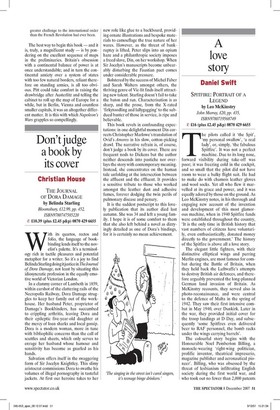Don't judge a book by its cover
Christian House THE JOURNAL OF DORA DAMAGE by Belinda Starling Bloomsbury, £12.99, pp. 452, ISBN9780747585220 £1039 (plus £2.45 p&p) 0870 429 6655 With its quartos, rectos and folio, the language of bookbinding lends itself to the novelist's palette. It's a terminology rich in tactile pleasures and potential metaphor for a writer. So it's a joy to find Belinda Starling doing itjustice in The Journal of Dora Damage, not least by situating this idiosyncratic profession in the equally emotive world of Victorian London.
In a clammy corner of Lambeth in 1859, within earshot of the clattering rails of the Necropolis Railway, Dora Damage struggles to keep her family out of the workhouse. Her husband Peter, proprietor of Damage's Bookbinders, has succumbed to crippling arthritis, leaving Dora and their epileptic five-year-old daughter at the mercy of loan sharks and local gossip. Dora is a modern woman, more in tune with bibliophilic concerns than the call of scuttles and sheets, which only serves to enrage her husband whose humour and sensitivity has become as gnarled as his hands.
Salvation offers itself in the swaggering form of Sir Jocelyn Knightley. This slimy aristocrat commissions Dora to swathe his volumes of illegal pornography in tasteful jackets. At first our heroine takes to her new role like glue to a backboard, providing ornate illustrations and bespoke materials to camouflage the true nature of her wares. However, as the threat of bankruptcy is lifted, Peter slips into an opium haze and a philanthropic society imposes a freed slave, Din, on her workshop. When Sir Jocelyn's manuscripts become unbearably disturbing the Faustian pact comes under considerable pressure.
Bolstered by the success of Michel Faber and Sarah Walters amongst others, the thriving genre of Vic-lit finds itself attracting new talent. Starling doesn't fail to take the baton and run. Characterisation is as sharp, and the prose, from the X-rated 'firkytoodling and lallygagging' to the subdued banter of those in service, is ripe and believable.
This book revels in confounding expectations: in one delightful moment Din corrects Christopher Marlowe's translation of Ovid's Amores in his slow, cotton-picking drawl. The narrative refrain is, of course, don't judge a book by its cover. There are frequent nods to Dickens but the author neither descends into pastiche nor overlays the story with contemporary meaning. Instead, she concentrates on the human tale unfolding at the intersection between the affluent and the effluent. It provides a sensitive tribute to those who worked amongst the leather dust and adhesive fumes, forever dodging the twin perils of pulmonary disease and penury.
It is the saddest postscript to this lovely publication that its author died last autumn. She was 34 and left a young family. I hope it is of some comfort to them that she also left behind a novel as dizzyingly detailed as one of Dora's bindings, for it is certainly no mean achievement.

























































 Previous page
Previous page